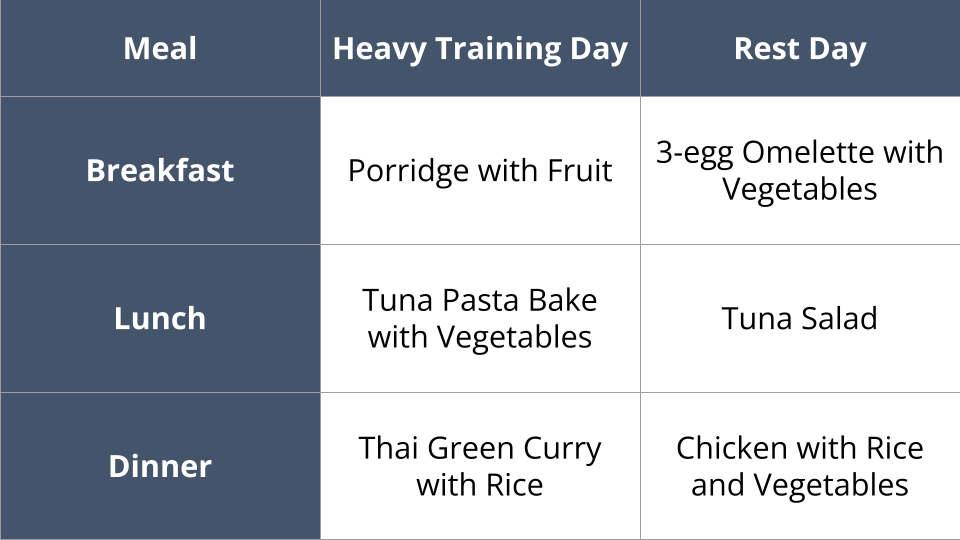Fuel For The Work Required
Compared to a normal training week, the week leading up to competition is likely to be lower in both training intensity and volume. As an example, you may lift lighter weights in the gym or have more rest days compared to what you are used to.
You may have heard of the phrase “fuel for the work required” which involves manipulating daily carbohydrate intake depending on the intensity and duration of a training session. Periodising your carbohydrate intake will ensure that you are fuelling and recovering well from training as well as managing body composition. In practice, on heavier training days (e.g., if you are a rower this you could encompass one water and one land-based training session) carbohydrate should be consumed as part of pre- and post-training meals as well as part of snacks throughout the day. However, on light training days or rest days, less carbohydrate and more protein may be consumed in order to match energy requirements and promote satiety.
Below is an example of how to periodise carbohydrate intake:
Focus on Recovery
Training leading up to competition can often be intense, therefore a taper week can help you recover both physically and mentally. Your nutrition should also play a key role in recovery by helping to replenish energy stores and reduce muscle fatigue. Throughout the taper, keep in mind the “Three R’s of Recovery”; refuel, repair and rehydrate. Post-training meals should contain a portion of complex carbohydrates to replenish glycogen stores, as well as a lean source of protein (~20-40g of protein) to support muscle repair. Great examples include spaghetti Bolognese, salmon with sweet potato and vegetables, and scrambled eggs on toast. Ideally, these should be consumed within 2-3 hours of finishing training.
Pack in the Antioxidants
In addition, try to consume antioxidant rich food throughout a taper week. Consuming foods such as berries and beetroot as well as some spices (e.g., turmeric and ginger) and nuts (e.g., walnuts and pecans) could help reduce muscle damage, fatigue, and any unnecessary inflammation.
Protect the Immune System
Aim to have at least five portions of fruit and vegetables per day. This can easily be achieved by including at least two or three different vegetables at each meal as well as one portion of fruit as a snack. Omega-3 fatty acids, which are most abundant in oily fish, can also have a positive effect on the immune system. Aim to consume at least one portion of oily fish such as salmon or mackerel at least once per week. Plant-based omega-3 sources include chia seeds, flax seeds, and walnuts.
Summary
Tapering prior to a competition can help you prepare both physically and mentally. Throughout a taper it is important to maintain a high-quality, nutrient dense diet which promotes good recovery and supports the immune system.
The lead-up to competition is the most vital part of the season, and there are many factors at play to determine whether you perform your best. At Innervate Performance we will remove the guesswork and ensure that your preparation is as good as it can be, so that you can focus on performing when it matters the most. Get in touch to find out more at info@innervateperformance.com
References
Le Meur, Y. Hausswirth, C. & Mujika, L. 2012. Tapering for competition: A review. Science & Sports. 27, pp.77-87.
Mujika, I., Padilla, S., Payne, D. & Busso, T. Physiological changes associated with the pre-event taper in athletes. Sports Medicine. 34, pp. 891-927.
Mujika, I. 2011.Tapering for triathlon competition. Journal of Human Sport and Exercise. 6(2), pp.264-270.
Trent, S. Maughan, R. & Burke, L. 2011. Nutrition for power sports: middle-distance running, track cycling, rowing, canoeing/kayaking, and swimming. Journal of Sport Sciences. Pp. 1-11.
Harriet is a Performance Nutritionist at Loughborough University where she specialises in supporting team-based university, national and international athletes. Harriet has worked within a multitude of sport including hockey, basketball, badminton and cricket. Harriet is a graduate in Sport and Exercise Science (2014) from the University of Leeds and also has a master in Sport and Exercise Nutrition (2016) from Loughborough University



